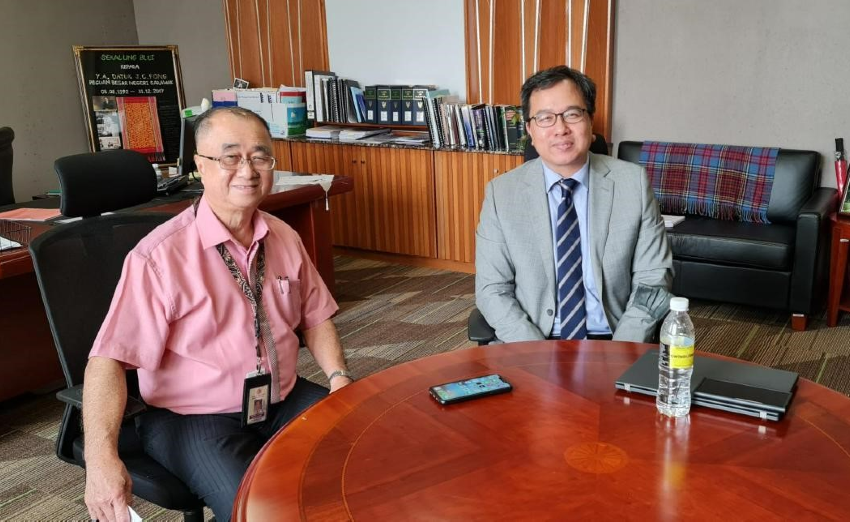KUCHING – Swinburne University of Technology Sarawak Campus recently met with YBhg Dato Sri Fong Joo Chung, Sarawak State Legal Counsel to talk about how a thorough understanding of the Malaysia Agreement 1963 (MA63) can be the impetus for business opportunities in Sarawak.
The Malaysia Agreement 1963 (MA63) provides a platform for the formation of Malaysia. It prescribes the rights of Sarawak when Sarawak joined the Federation. It confirms that Sarawak joined the Federation as a partner and not merely as one of the States in Malaysia.
According to Dato Sri Fong, it is crucial for Sarawakians to know and understand the constitutional significance of MA63. For entrepreneurs and businesspeople, while they focus primarily on the affairs of their businesses, it would serve them well to understand the importance of MA63 on the economy of Sarawak and how this understanding can boost business opportunities domestically.
Fong emphasises that “the Malaysia Agreement provides Sarawak with certain safeguards for its special interests, rights and privileges. These include a certain degree of financial autonomy and additional sources of revenue. This factor is vital for Sarawak’s development, prosperity, and well-being of its people and in creating more business opportunities for businesses and the community.
With a certain degree of financial autonomy, the State Government can pursue policies that accelerate the state’s development, creating opportunities for its citizens and businesses.
Fong also highlights the control Sarawak has over its natural resources such as land, forestry, and minerals. This control not only generates revenue for the state but also opens up opportunities for involvement in industries like oil and gas, minerals, and downstream sectors, including the timber industry.
“Safeguarding these rights ensures that Sarawakians can participate in these ventures, acquire the necessary knowledge and skills, and support the growth of these industries,” In summary, MA63 is not simply a document governing the relationship between the state and the federal government. It guarantees Sarawak a level of financial autonomy and additional revenue sources necessary for the state to shape its own destiny, he concluded.
Fong also stressed on the importance of understanding how the federation or federal system of Government works, which entails a certain degree of constitutional literacy. “Organising talks, such as the one hosted by Swinburne, is a way to promote constitutional literacy and help more people gain a better understanding and appreciation of the State’s constitutional rights. This knowledge will enable them to protect against any encroachment or erosion of those rights.”
He pointed out that it is crucial to have a better understanding of the federal system, and why specific provisions have been incorporated into the Constitution to safeguard the states’ rights within the federation.
“As a federation, the Malayan states do not have the same sort of rights as the East Malaysian regions. The federation uniquely grants the East Malaysian regions more legislative powers, a greater degree of financial autonomy, more sources of revenues and to some extent, special taxation powers, and on how revenue is supposed to be shared between the Federal, Regions and the States,” he explained.
Dato Sri JC Fong has constantly emphasized that while Malaysia needs a strong central government to hold the federation together, it should not intrude into the autonomy that has been assured to Sarawak.
In 1966, two significant acts, namely the Petroleum Mining Act and the Continental Shelf Act, were passed. However, these acts were not extended to East Malaysia due to the different legislative positions of Sabah and Sarawak compared to the states in West Malaysia. The absence of the North Borneo (Alteration of Boundaries) Order in Council 1954, issued by Her Majesty The Queen of Britain, plays a role in this distinction.
He outlined the importance of recognising that the Continental Shelf is an integral part of Sarawak’s territory, and the seabed and subsoils are considered state land since Sarawak’s inception as a part of Malaysia.
“However, the enforcement of the two federal acts mentioned earlier is not applicable in Sabah and Sarawak due to the involvement of state land, which encompasses the Continental Shelf, seabed, and subsoil, regardless of the nature of the waters above it,” Fong explained.
For those seeking further reading on this subject, Dato Sri JC Fong recommends exploring the works of Andrew Harding. Harding compared federalism in Malaysia with the concept of devolution of powers for Scotland. He also recommended author Philip Koh Tong Ngee for more on the subject.
“As long as these constitutional safeguards are entrenched, Sarawak’s rights to her rich mineral resources and boundaries are respected, and the financial resources are well managed, the State should be able to progress towards a high-income economy by 2030 with opportunities for all Sarawakians,” Fong concluded.
The interview took place as part of the University’s SwinTalk Series 2023.
SwinTalk Series is a quarterly event organised with industry partners with the aim of developing knowledge and promoting sharing of experience and mentorship. Open to members of the public, SwinTalk Series #1 was organised in collaboration with the Sarawak Chamber of Commerce and Industry (SCCI), and featured Dato Sri JC Fong as the distinguished keynote speaker.
For more information on Swinburne Sarawak, visit our website, Facebook page (@swinburnesarawak), Instagram (@swinburnesarawak), Twitter page (@Swinburne_Swk) or YouTube channel (Swinburne Sarawak).
By Markson Chin, Deputy Head of School, School of Business, Faculty of Business, Design and Arts and Elizabeth Voong, Associate Dean, External Engagement and Impact & Lecturer in Accounting School of Business, Faculty of Business, Design and Arts.


